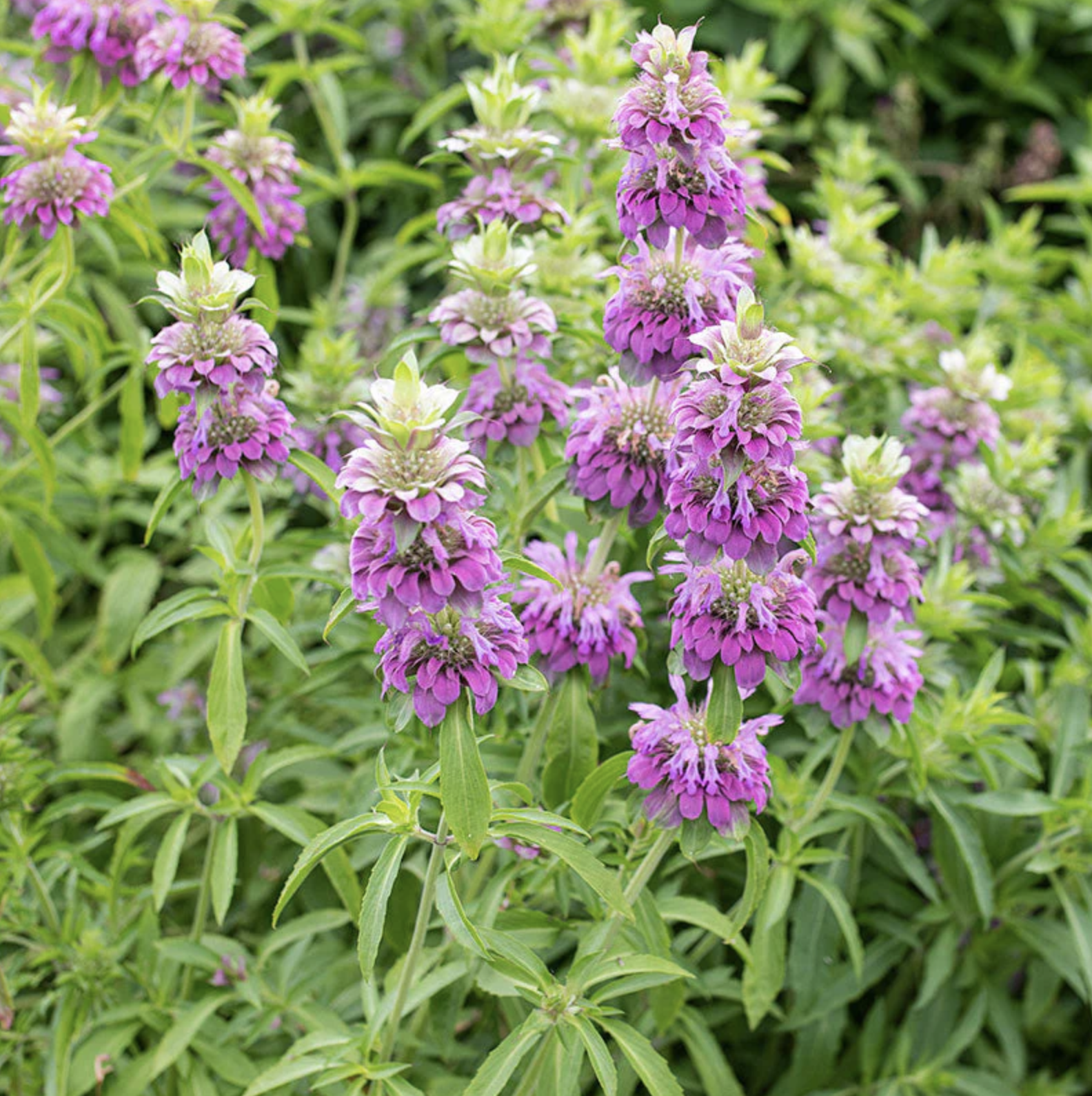 Image 1 of 1
Image 1 of 1


Bergamot, Lemon
Monarda citriodora
Description:
Lemon Bergamot is the lemon-scented ray of sunshine your garden didn’t know it needed. This charming annual (sometimes biennial) wildflower bursts with whimsical, lavender-pink blooms stacked like little pagodas on slender green stems. A member of the mint family, it fills the air with a citrusy aroma that delights the senses and makes it a true multi-sensory star in your pollinator or herb garden.
Wildlife Benefits:
Pollinators absolutely swoon for this plant. Bees, butterflies, and even hummingbirds flock to its nectar-rich flowers, making it an essential addition for supporting local wildlife. And bonus? Its fragrance also makes it a natural pest deterrent—mosquitoes don’t love it, which means you just might.
Medicinal Benefits:
Lemon Bergamot has long been used in folk herbalism to soothe colds, fevers, and mild digestive issues. Its lemony leaves make a delicious and calming herbal tea that can help ease anxiety and support immune function. As always, check with a trusted herbalist before adding it to your home apothecary.
Native Status:
Native to the southern U.S., including Georgia, this heat-loving herb thrives in local gardens and fits right in with dry, sandy soils and sunny meadows. It reseeds easily, so expect it to stick around and mingle with next year’s blooms.
Pollinator Friendliness:
Lemon Bergamot shines as a mid-season nectar source, keeping your garden buzzing from spring into early summer. It’s especially beneficial to native bees and other beneficial insects looking for a reliable, fragrant pit stop.
Planting Guidelines:
Height: 1–3 feet
Spacing: 10–12 inches
Sun/Shade: Full Sun to Light Shade
Soil Preference: Well-drained, sandy or loamy soil
How to Grow: Direct sow after frost or transplant young seedlings. Water regularly until established, then let this drought-tolerant beauty do its thing. Prune back after flowering to encourage a second flush or leave seed heads for winter interest and self-seeding.
Invite pollinators, repel pests, and sip on your own citrus-scented tea—Lemon Bergamot is a delightful garden multitasker that brings beauty, aroma, and wellness to every sunny spot.
Available in 2.5 inch and 4.25 inch (quart) pots.
Monarda citriodora
Description:
Lemon Bergamot is the lemon-scented ray of sunshine your garden didn’t know it needed. This charming annual (sometimes biennial) wildflower bursts with whimsical, lavender-pink blooms stacked like little pagodas on slender green stems. A member of the mint family, it fills the air with a citrusy aroma that delights the senses and makes it a true multi-sensory star in your pollinator or herb garden.
Wildlife Benefits:
Pollinators absolutely swoon for this plant. Bees, butterflies, and even hummingbirds flock to its nectar-rich flowers, making it an essential addition for supporting local wildlife. And bonus? Its fragrance also makes it a natural pest deterrent—mosquitoes don’t love it, which means you just might.
Medicinal Benefits:
Lemon Bergamot has long been used in folk herbalism to soothe colds, fevers, and mild digestive issues. Its lemony leaves make a delicious and calming herbal tea that can help ease anxiety and support immune function. As always, check with a trusted herbalist before adding it to your home apothecary.
Native Status:
Native to the southern U.S., including Georgia, this heat-loving herb thrives in local gardens and fits right in with dry, sandy soils and sunny meadows. It reseeds easily, so expect it to stick around and mingle with next year’s blooms.
Pollinator Friendliness:
Lemon Bergamot shines as a mid-season nectar source, keeping your garden buzzing from spring into early summer. It’s especially beneficial to native bees and other beneficial insects looking for a reliable, fragrant pit stop.
Planting Guidelines:
Height: 1–3 feet
Spacing: 10–12 inches
Sun/Shade: Full Sun to Light Shade
Soil Preference: Well-drained, sandy or loamy soil
How to Grow: Direct sow after frost or transplant young seedlings. Water regularly until established, then let this drought-tolerant beauty do its thing. Prune back after flowering to encourage a second flush or leave seed heads for winter interest and self-seeding.
Invite pollinators, repel pests, and sip on your own citrus-scented tea—Lemon Bergamot is a delightful garden multitasker that brings beauty, aroma, and wellness to every sunny spot.
Available in 2.5 inch and 4.25 inch (quart) pots.
